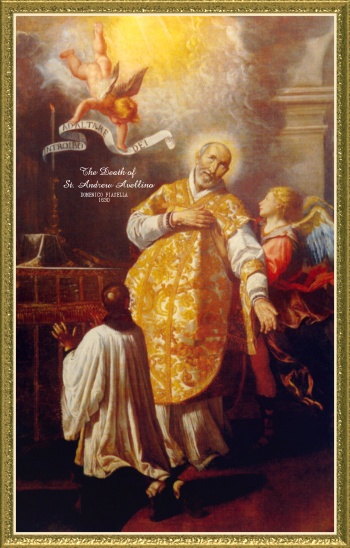Difference between revisions of "St. Andrew Avellino"
(→Biography) |
|||
| (6 intermediate revisions by the same user not shown) | |||
| Line 1: | Line 1: | ||
| + | [[File:Avellino.jpg|thumb|Alt=|350px|left|St. Andrew Avellino]] | ||
==Conditions== | ==Conditions== | ||
* Strokes | * Strokes | ||
*High Blood Pressure | *High Blood Pressure | ||
| + | * Apoplexy | ||
| + | |||
==Biography== | ==Biography== | ||
| − | + | Theologian, founder, and friend of St. Charles Borromeo. | |
| − | + | Born in 1521 at Castronuovo, (today Castronuovo di Sant'Andrea) a small town in the province of Potenza Basilicata, his baptismal name was Lancelotto, which out of love for the cross he changed into Andrew when he entered the Order of Theatines. | |
| − | + | A devoted young man who was also very handsome, Andrew studied in Venice and in Naples, being ordained and receiving a Doctorate of Laws at the age of twenty-six. He served in the ecclesiastical court in Naples until he realized that he was capable of lying in order to win a legal argument. His remorse led to his retirement from the court, and he was commissioned by the archbishop of Naples to reform a lax convent in the city. He was attacked by a group of men who opposed this reformation and was taken to the Theatine monastery to recuperate in safety. Andrew entered the Order of Theatines, which had been founded just a few years before by St. Cajetan. After completing his novitiate, Andrew visited the shrines of Rome, returning to Naples to become the director of novices for the Theatines. He also founded several new Theatine monasteries, serving as superior in some. St. Charles Borromeo learned to depend on Andrew's wisdom in affairs of the Church. He also wrote treatises and preached. On 10 November 1608, when beginning the Holy Sacrifice of the Mass, he was stricken with apoplexy, and after receiving the Holy Viaticum, died at the age of eighty-eight. In 1624, only 16 years after his death, he was beatified by Pope Urban VIII, and in 1712 was canonized by Pope Clement XI. He is a patron of Sicily and is invoked against sudden death. He is buried in Naples. | |
| − | + | ||
| − | + | ||
| − | + | ||
| − | + | ||
| − | |||
==Celebration Day== | ==Celebration Day== | ||
10 November | 10 November | ||
==pelerinage== | ==pelerinage== | ||
| − | + | * https://en.wikipedia.org/wiki/San_Paolo_Maggiore | |
| + | * http://www.santandreaavellino.it/ | ||
| + | [[Category:Patron Saints for Healing]] | ||
Latest revision as of 05:31, 24 July 2016
Conditions
- Strokes
- High Blood Pressure
- Apoplexy
Biography
Theologian, founder, and friend of St. Charles Borromeo. Born in 1521 at Castronuovo, (today Castronuovo di Sant'Andrea) a small town in the province of Potenza Basilicata, his baptismal name was Lancelotto, which out of love for the cross he changed into Andrew when he entered the Order of Theatines. A devoted young man who was also very handsome, Andrew studied in Venice and in Naples, being ordained and receiving a Doctorate of Laws at the age of twenty-six. He served in the ecclesiastical court in Naples until he realized that he was capable of lying in order to win a legal argument. His remorse led to his retirement from the court, and he was commissioned by the archbishop of Naples to reform a lax convent in the city. He was attacked by a group of men who opposed this reformation and was taken to the Theatine monastery to recuperate in safety. Andrew entered the Order of Theatines, which had been founded just a few years before by St. Cajetan. After completing his novitiate, Andrew visited the shrines of Rome, returning to Naples to become the director of novices for the Theatines. He also founded several new Theatine monasteries, serving as superior in some. St. Charles Borromeo learned to depend on Andrew's wisdom in affairs of the Church. He also wrote treatises and preached. On 10 November 1608, when beginning the Holy Sacrifice of the Mass, he was stricken with apoplexy, and after receiving the Holy Viaticum, died at the age of eighty-eight. In 1624, only 16 years after his death, he was beatified by Pope Urban VIII, and in 1712 was canonized by Pope Clement XI. He is a patron of Sicily and is invoked against sudden death. He is buried in Naples.
Celebration Day
10 November
